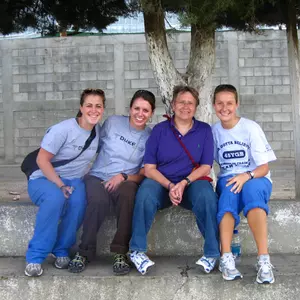Upcoming Event: Women's Basketball versus North Carolina on February 15, 2026 at 1 p.m.









7/23/2007 12:00:00 AM | Women's Basketball
DURHAM, N.C. ? Senior guard Emily Waner is in Guatemala with the Duke Medical Center's CAPE Program. CAPE (Collegiate Athlete Pre-Medical Experience) is a year-round program offered by the Duke University Medical Center and the Preston Robert Tisch Brain Tumor Center to female athletes on Duke's twelve collegiate varsity athletic teams. The program provides participants with a wide variety of clinical experiences that provide exposure to the world of Medicine. CAPE is designed to engage some of the nation's highest achieving young women in medical science and to help them onto the path toward careers in Medicine.
Waner shared her experiences with GoDuke.com in a recent blog.
“And neither side will leave here unchanged.” These words could not be truer for my experience in Uspantan, Guatemala. I am here with Terry Kruger (the director of CAPE), Kim Imbesi (our superstar lacrosse goalie), and Jen Fraser (ex-track athlete and soon to be in her first year at Duke Medical school). We are here with a group called HELPS International and their mission is to improve the lives of the Guatemalan people by providing health care and implementing preventative measures in their environment and lifestyle.
We came here knowing that we we're going on a medical mission with little knowledge of what lay in front of us. We are leaving Uspantan with our minds and thoughts in a whirlwind of emotions and our lives changed forever.
Each of us has had very different experiences because we have been working in different parts of the hospital and have fulfilled different responsibilities on the team. Our trip began with our arrival in Guatemala City. The next day we woke up at 5:30 am and began our 8 hour journey into the mountains of Guatemala to Uspantan. The hospital where we work is the same place where we eat and sleep. I was amazed at how the small hospital with few doctors and several nurses was instantaneously turned into a bustling, working, breathing, and living hospital within hours. This past week has been really intense and everyone has worked from sunrise to sundown. I have never been so exhausted at the end of the day, yet simultaneously so energized. Every smile, hug, kiss on the cheek and prayer of thanks gives each of us a bounce to our step. The people and the purpose drive each of us to get out of our cots and set out on our mission for the day.
I have been on the Stoves team here. The mission of Stoves is to travel to the nearby villages and install two stoves in the homes. The top killers in this area are respiratory diseases. This is because the Mayan culture has always built houses without a chimney and they cook over an open fire. Therefore the houses are filled with high levels of carbon monoxide. The women who are responsible for the cooking and the children who spend the most time in the house are the ones who suffer the most. The stoves are very modest, but they are built so that they heat up faster, have a chimney, require less wood, and are more insulated in order to prevent burns. The stoves are so much more efficient that they end up saving the women 2 days a week of time. The women on average carry 9 tons of firewood a year for cooking. Therefore many of the women have come to the hospital with hernias and back problems. By requiring less firewood the stoves aim to ease and alleviate some of these problems.
The homes have mud floors, usually have one or two beds for an entire family, and the walls are typically made of wood that are not completely insulated and you can usually see sunlight peaking through cracks in the walls and roof. The families are so receptive to us and excited for their new stoves. The children are usually timid at first, but are very curious and watch us intently. Once we get out the bubbles, coloring books, and sunglasses to give them the children light up with huge smiles. They love taking pictures with us and then getting to see their picture on the digital screen afterwards. One adorable girl, Elaina, who was about 3 kept blowing bubbles into the lens of my camera, giggling, “Foto, foto.” And then ran behind me to see her picture and the bubbles. I can not fully put into words the feeling I get walking away from a house like that, knowing that maybe children like Elaina will grow up without being debilitated by respiratory diseases or severe burns from their fire.
And so it is true that both sides are changed. The families have found hope in the beginnings of a tide of change. Change may be slow, but every small step can improve the lives of these people. These changes and the many more that need to come can help change their lives and allow them to place their feet on the first rungs of the economic ladder. We too are changed. You can not leave here without feeling the responsibility that comes with knowledge. Our hearts are changed. The smiles from their bright-eyed children and appreciative glances from the women is something that I will never forget. Their lives are simple and they live in poverty, yet the smiles they carry and the warmth they still exude gives me a perspective on life that has moved me forever.
~ A special hello to my teammates and all of the wonderful people we love back at Duke and in the States.